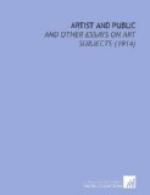After Impressionism, what? We have no name for it but Post-Impressionism. Such men as Cezanne, Gauguin, Van Gogh recognized the sterility of Impressionism and of a narrow aestheticism, while they shared the hatred of the aesthetes and the Impressionists for the current art of the salons. No more than the aesthetes or the Impressionists were they conscious of any social or universal ideals that demanded expression. The aesthetes had a doctrine; the Impressionists had a method and a technic. The Post-Impressionists had nothing, and were driven to the attempt at pure self-expression—to the exaltation of the great god Whim. They had no training, they recognized no traditions, they spoke to no public. Each was to express, as he thought best, whatever he happened to feel or to think, and to invent, as he went along, the language in which he should express it. I think some of these men had the elements of genius in them and might have done good work; but their task was a heart-breaking and a hopeless one. An art cannot be improvised, and an artist must have some other guide than unregulated emotion. The path they entered upon had been immemorially marked “no passing”; for many of them the end of it was suicide or the madhouse.
But whatever the aberrations of these, the true Post-Impressionists—whatever the ugliness, the eccentricity, or the moral dinginess into which they were betrayed—I believe them to have been, in the main, honest if unbalanced and ill-regulated minds. Whatever their errors, they paid the price of them in poverty, in neglect, in death. With those who pretend to be their descendants to-day the case is different; they are not paying for their eccentricity or their madness, they are making it pay.
The enormous engine of modern publicity has been discovered by these men. They have learned to advertise, and they have found that morbidity, eccentricity, indecency, extremes of every kind and of any degree are capital advertisement. If one cannot create a sound and living art, one can at least make something odd enough to be talked about; if one cannot achieve enduring fame, one may make sure of a flaming notoriety. And, as a money-maker, present notoriety is worth more than future fame, for the speculative dealer is at hand. His interest is in “quick returns” and he has no wish to wait until you are famous—or dead—before he can sell anything you do. His process is to buy anything he thinks he can “boom,” to “boom” it as furiously as possible, and to sell it before the “boom” collapses. Then he will exploit something else, and there’s the rub. Once you have entered this mad race for notoriety, there is no drawing out of it. The same sensation will not attract attention a second time; you must be novel at any cost. You must exaggerate your exaggerations and out-Herod Herod, for others have learned how easy the game is to play, and are at your heels. It is no longer a matter of misunderstanding and being misunderstood by the public; it is a matter of deliberately flouting and outraging the public—of assuming incomprehensibility and antagonism to popular feeling as signs of greatness. And so is founded what Frederic Harrison has called the “shock-your-grandmother school.”




